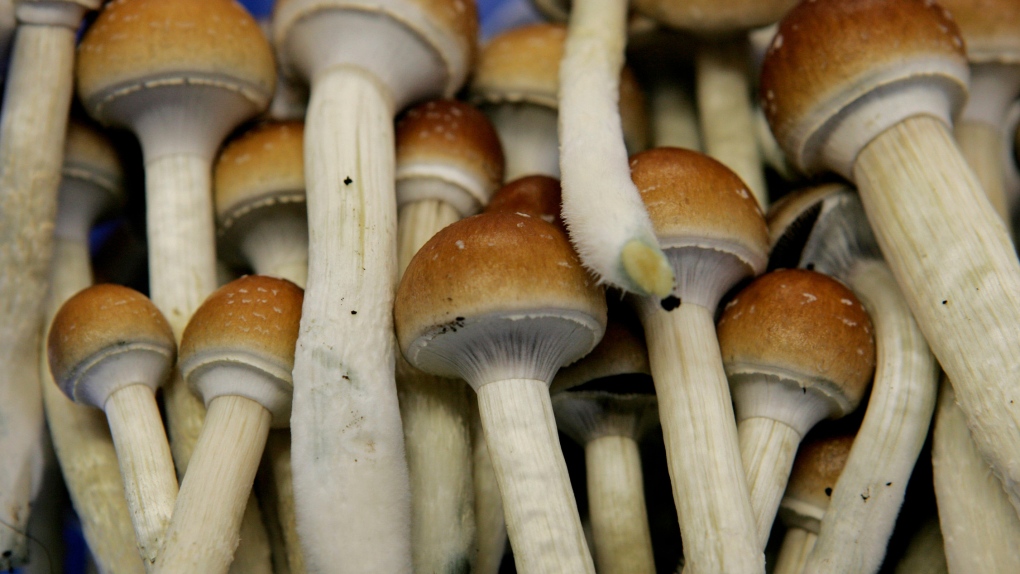University of Guelph receives licence to grow 'magic' mushrooms
 In this Aug. 3, 2007, file photo magic mushrooms are seen in a grow room at the Procare farm in Hazerswoude, central Netherlands. (AP Photo/Peter Dejong, File)
In this Aug. 3, 2007, file photo magic mushrooms are seen in a grow room at the Procare farm in Hazerswoude, central Netherlands. (AP Photo/Peter Dejong, File)
Scientists at University of Guelph have received a rare licence from Health Canada to grow and cultivate psilocybin producing mushrooms, and are hoping their research could help unlock other potentially beneficial compounds produced by the fungi.
The U of G says it is one first universities in Canada to be approved to produce what are commonly known as “magic mushrooms.”
“What we’re really interested in looking at is the diversity in the mushroom,” said Max Jones, an associate professor of plant agriculture at the University of Guelph.
While many people may think of psychedelic mushrooms as a single species, in reality there are over 200 different species that produce psilocybin, Jones explained.
“As a biologist, what that implies to me is there’s an evolutionary pressure for these mushrooms to be producing compounds that interact with the human brain,” Jones said.
“And so our real question is, what else are they producing?”
Once Jones and his team cultivates the mushrooms, other scientists at the University of Guelph will analyze their compounds and use cellular models to see how any newly discovered properties might interact with the human brain.
“We suspect there’s a whole diversity of compounds that are undiscovered,” he said.
There are no plans to use the mushrooms in clinical, i.e. human trials at the University of Guelph, but Jones said one of the goals of the project is to provide a reliable supply for other researchers doing work in the field.
Interest in the therapeutic effects of psilocybin is growing, with the compound emerging as a promising avenue to treat depression, post-traumatic stress disorder and addiction.
The Centre for Addiction and Mental Health (CAMH) is currently conducting its second major clinical psilocybin trial.
“Everyone knows someone that suffers from mental illness of some sort that may benefit from this research – and psilocybin is one thing, but there might be other compounds that have just as much medical value, or interact with psilocybin to make it more effective,” Jones said.
The university says the mushrooms will be grown in a “high-security facility” on campus that meets Health Canada’s standards.
CTVNews.ca Top Stories

Can the Governor General do what Pierre Poilievre is asking? This expert says no
A historically difficult week for Prime Minister Justin Trudeau and his Liberal government ended with a renewed push from Conservative Leader Pierre Poilievre to topple this government – this time in the form a letter to the Governor General.
Two U.S. Navy pilots shot down over Red Sea in apparent 'friendly fire' incident, U.S. military says
Two U.S. Navy pilots were shot down Sunday over the Red Sea in an apparent 'friendly fire' incident, the U.S military said, marking the most serious incident to threaten troops in over a year of America targeting Yemen's Houthi rebels.
Ottawa MP Mona Fortier appointed chief government whip
Ottawa-Vanier MP Mona Fortier has been appointed as chief government whip, the latest addition in a major reshuffle of Prime Minister Justin Trudeau's cabinet.
opinion Tom Mulcair: Prime Minister Justin Trudeau's train wreck of a final act
In his latest column for CTVNews.ca, former NDP leader and political analyst Tom Mulcair puts a spotlight on the 'spectacular failure' of Prime Minister Justin Trudeau's final act on the political stage.
B.C. mayor gets calls from across Canada about 'crazy' plan to recruit doctors
A British Columbia community's "out-of-the-box" plan to ease its family doctor shortage by hiring physicians as city employees is sparking interest from across Canada, says Colwood Mayor Doug Kobayashi.
Bluesky finds with growth comes growing pains - and bots
Bluesky has seen its user base soar since the U.S. presidential election, boosted by people seeking refuge from Elon Musk's X, which they view as increasingly leaning too far to the right given its owner's support of U.S. president-elect Donald Trump, or wanting an alternative to Meta's Threads and its algorithms.
'There’s no support': Domestic abuse survivor shares difficulties leaving her relationship
An Edmonton woman who tried to flee an abusive relationship ended up back where she started in part due to a lack of shelter space.
opinion King Charles' Christmas: Who's in and who's out this year?
Christmas 2024 is set to be a Christmas like no other for the Royal Family, says royal commentator Afua Hagan. King Charles III has initiated the most important and significant transformation of royal Christmas celebrations in decades.
OPP find wanted man by chance in eastern Ontario home, seize $50K worth of drugs
A wanted eastern Ontario man was found with $50,000 worth of drugs and cash on him in a home in Bancroft, Ont. on Friday morning, according to the Ontario Provincial Police (OPP).


































